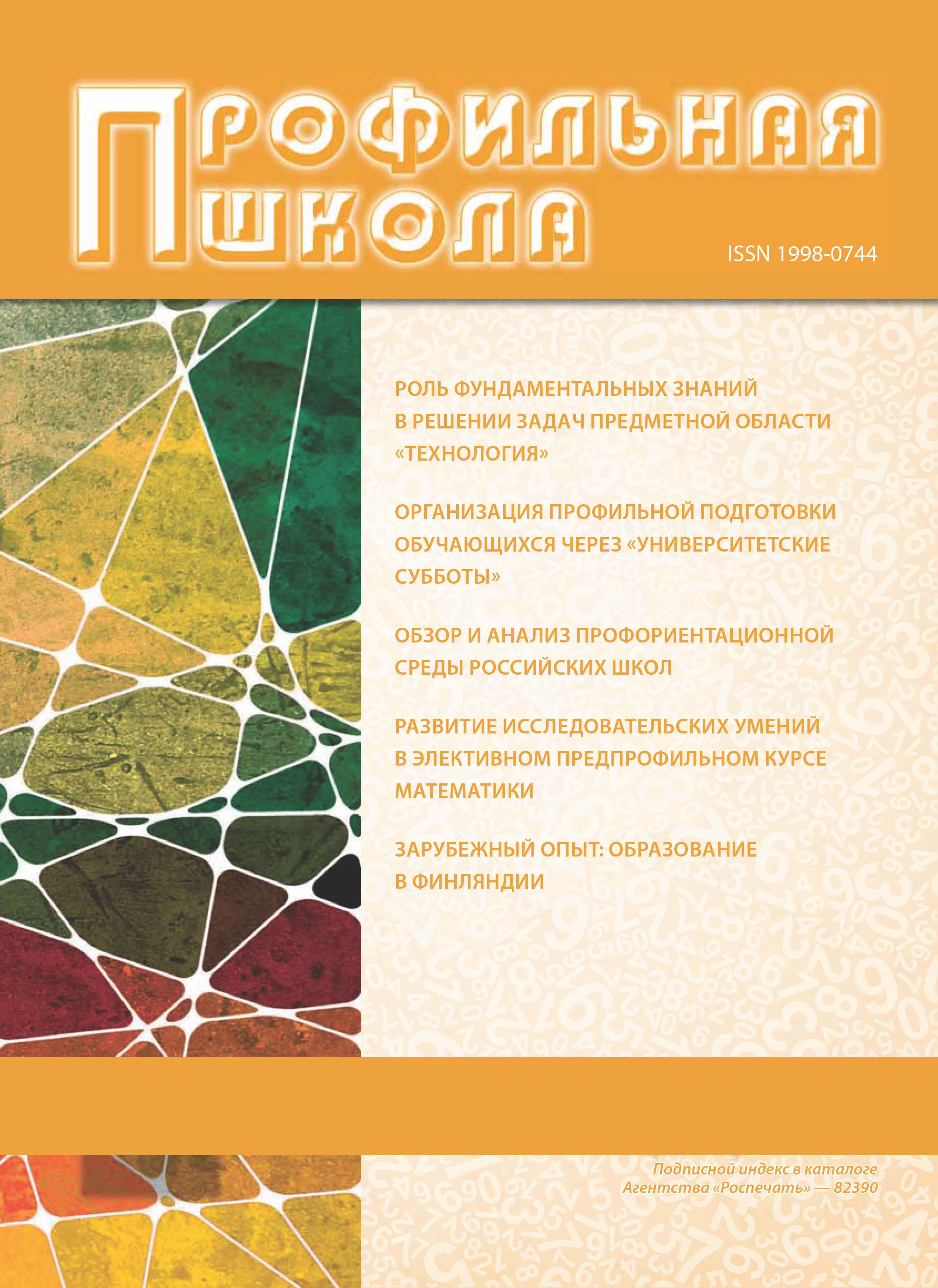Moscow State Regional University
Russian Federation
The article discusses the didactic aspects of the formation of functional literacy of students in the process of teaching chemistry. The article reflects the concept of semantic reading in chemistry, the content of which is considered in the context of functional literacy. The article draws attention to the fact that the majority of schoolchildren experience serious difficulties with the literacy of reading chemical texts and the use of what they read in practice and in life. The structural components of task development are revealed: the context, the chemical content of the task and mental activity. Examples of tasks that reveal the quality of understanding the text, as well as methodological approaches to the formation of functional literacy of students in the process of teaching chemistry at a profile level are given.
functional literacy, science literacy, specialized school, advanced level, semantic reading, structural components of functional literacy, examples of tasks in chemistry
1. Ahmetov N.S. Neorganicheskaja himija: Uchebnoe posobie dlja uchashhihsja 8-9 klassov shkol s uglublennym izucheniem himii [Inorganic Chemistry: A textbook for students in grades 8-9 schools with advanced study of chemistry]. Moscow: Prosveshhenie Publ., 1988. 400 p.
2. Volkova S.A. Didakticheskie aspekty proektirovanija shkol'nogo uchebnika himii [Didactic aspects of designing a school chemistry]. Otechestvennaja i zarubezhnaja pedagogika [Domestic and foreign pedagogy]. 2016, I. 2, pp. 33-47. EDN: https://elibrary.ru/VVCQQD
3. Volkova S.A. Didaktiko-metodicheskie problemy sovremennogo obrazovanija [Didactic and methodological problems of modern education]. Otechestvennaja i zarubezhnaja pedagogika [Domestic and foreign pedagogy]. 2017, V. 2, I. 4 (42), pp. 77-84. EDN: https://elibrary.ru/LBOHBZ
4. Volkova S.A., Lisovskaja L.P. Organizacija obuchenija shkol'nikov cherez universitetskie profil'nye klassy [Organization of teaching schoolchildren through university profile classes]. Mezhdunarodnaja nauchnaja Internet-konferencija «Zadachi i perspektivy obuchenija himii v profil'noj shkole», 18-24 aprelja 2012 [International scientific Internet conference "Tasks and prospects of teaching chemistry in a profile school", April 18-24, 2012]. Poltava, 2012, pp. 32-38.
5. Volkova S.A., Tarakanova N.A. Vlijanie informacionno-predmetnoj sredy na process formirovanija nauchnoj gramotnosti shkol'nikov po himii [Influence of the information-subject environment on the process of formation of scientific literacy of schoolchildren in chemistry]. Sbornik materialov Mezhdunarodnoj nauchno-prakticheskoj konferencii «Sovremennoe sostojanie i puti razvitija informatizacii obrazovanija v zdorov'esberegajushhih uslovijah», 10 nojabrja 2016 g. Moskva. Setevoe izdanie «Uchenye zapiski IUO RAO» [Collection of materials of the International scientific-practical conference "Current state and ways of developing informatization of education in health-saving conditions", November 10, 2016 Moscow]. I. 4(60), 2016, pp. 51-54. Available at: http://iuorao.com/setevoe-izdanie/vypuski-izdaniya.html
6. Gerus S.A. Teorija i praktika racionalizacii processa obuchenija himii v srednej shkole [Theory and practice of rationalizing the process of teaching chemistry in secondary school]. St. Petersburg: RGPU im. A.I. Gercena Publ., 2003. 160 p. EDN: https://elibrary.ru/QTMCAF
7. Eremin V.V. Himija: Uglublennyj uroven': 11 klass [Chemistry: Advanced level: Grade 11]. Moscow: Drofa Publ., 2020. 477 p.
8. Kalina I.I. Uchitel'skaja gazeta [Teacher's newspaper]. 2018, I. 6.
9. Leont'ev A.A. Pedagogika zdravogo smysla. Izbrannye raboty po filosofii obrazovanija i pedagogicheskoj psihologii [Common Sense Pedagogy. Selected works on philosophy of education and educational psychology]. Moscow: Smysl Publ., 2016. 528 p.
10. Osnovnye rezul'taty mezhdunarodnogo issledovanija PISA-2015 [The main results of the international research PISA-2015]. Centr ocenki kachestva obrazovanija ISRO RAO [Center for assessing the quality of education ISRO RAO]. 2016. Available at: www.centeroko.ru (accessed 11 June 2019).
11. Pentin A.Ju., Nikiforov G.G., Nikishova E.A. Osnovnye podhody k ocenke estestvennonauchnoj gramotnosti [Basic approaches to the assessment of natural science literacy]. Otechestvennaja i zarubezhnaja pedagogika [Domestic and foreign pedagogy]. 2019, V. 1, I. 4 (61), pp. 80-97. EDN: https://elibrary.ru/HGDSZW
12. Sumatohin S.V. Formirovanie u uchashhihsja navyka smyslovogo chtenija pri obuchenii biologii [Formation of the skill of semantic reading in students in teaching biology]. Pedagogicheskoe obrazovanie i nauka [Pedagogical education and science]. 2015, I. 1, pp. 12-16. EDN: https://elibrary.ru/UFZWSJ
13. Ukaz Prezidenta Rossijskoj Federacii «O nacional'nyh celjah i strate-gicheskih zadachah razvitija Rossijskoj Federacii na period do 2024 goda» №204 ot 7 maja 2018 goda [Decree of the President of the Russian Federation "On national goals and strategic objectives of the development of the Russian Federation for the period up to 2024" No. 204 dated May 7, 2018]. Available at: http://www.kremlin.ru/acts/bank/43027.
14. Federal'nyj gosudarstvennyj obrazovatel'nyj standart srednego obshhego obrazovanija [Federal state educational standard of secondary general education]. Federal'nye gosudarstvennye obrazovatel'nye standarty [Federal state educational standards]. Moscow. Available at: https://fgos.ru/.
15. Magomed Abdurazakov, Svetlana Volkova, Djavanshir Gadjiev, Olga Lyaginov. The Concept Of Electronic Learning With The Application Of Digital Technologies // Proceedings of the International Scientific Conference Innovative Approaches to the Application of Digital Technologies in Education and Research (SLET-2019). Stavropol-Dombay, Russia, May 20-23, 2019. Vol-2494 urn:nbn:de:0074-2494-6 - ISSN 1613-0073. http://ceur-ws.org/Vol-2494/paper_1.pdf
16. Svetlana A. Volkova. Theory and practice of updating the content of education in chemistry and teaching methods, in view of modern science and technology achievements / Svetlana A. Volkova // Espacios, 2018, V. 39, No. 05, pp. 32.






